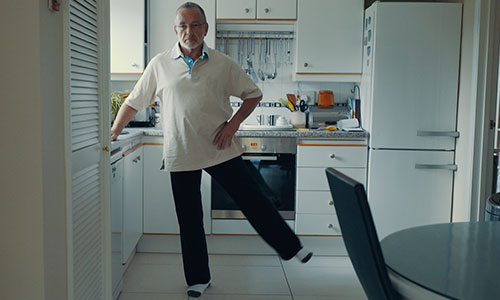Active recovery from surgery, pain or injury
- Overview
After injury or an operation, it’s hard to know what exercises are safe to do and how far to push yourself. Physical pain can impact your confidence and mood too, which can deter you from getting moving at all, let alone going to the gym. Don't let these doubts or anxieties stand between you and your wellbeing.
“I’m not in good physical shape. Personal training isn't right for me”

You might think that personal training is just for people gearing up to run a marathon, but in reality it's for everyone, whatever your abilities or condition.
Whether you suffer from arthritis or lower back pain, recently had knee or shoulder surgery, or are recovering from a fracture, getting moving is more beneficial than staying still.
A personal trainer will assess you, take into account any existing conditions, and devise a bespoke programme to suit your abilities and goals. If you’re recovering from a sprain, strain or similar, they can help you return to your pre-injury form with safe exercises.
Guided exercise with a qualified personal trainer can help you recover from and manage a range of physical conditions safely and with confidence.
“I'm not sure if I need personal training or physiotherapy”
Physiotherapists are excellent at assessing the clinical side of injury or an ongoing condition. They can gauge when it is appropriate to perform certain activities and can advise on the kinds of exercises to perform to rehabilitate a particular area.
A personal trainer can work with you on putting the information from a physiotherapist into practice. They will ensure exercises are performed at the correct intensity for your particular stage in recovery, and make sure your technique stays correct. This will enable muscles, bones and joints heal correctly and return to normal function as soon as possible.
“What exercises can I even do?”
When recovering from an injury – rehabilitation exercises are key. They are not always the most enjoyable or glamorous exercises, but it is crucial that they are done often and well. Expect gentle, manageable exercises that gradually increase your field of movement around the area affected. And prepare yourself for lots of repetition.
After surgery, in the first few weeks, your body’s movement may be very limited, so complex exercises won't be appropriate. In this case, your surgeon or physiotherapist will advise you on what exercises to do and for how long. If your surgery was carried out by Nuffield Health and qualifies for our Recovery Plus Programme, you could be back on your feet even sooner.
Once you’ve been given the all clear to do more exercise, coming back to more complex movements and activities with a trainer could help you to feel more confident in your body’s abilities.
“How do I know I’m in safe hands?”
All Nuffield Health Personal Trainers are accredited by either the Chartered Institute for the Management of Sport and Physical Activity (CIMSPA) or Register of Exercise Professionals (REPs) and are trained to a high standard. They undertake continuous training throughout their career, and stay up-to-date with the latest developments in the field, to ensure that our members receive the best service possible
Personal training is exactly that, ‘personal’, and we insist that it's of the highest quality. Exercises will be tailored to your specific needs and goals. It doesn’t matter who you are, what physical state you’re in or what you want to achieve, a personal trainer will help and support you on your journey safely.
Find out more about Personal Training today. It might just surprise you.
Last updated Tuesday 22 August 2023
First published on Thursday 25 May 2017

